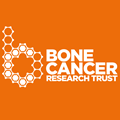Story
Elizabeth was an international para-cyclist, riding as part of the GB para-cycling team and proudly representing her country at world-class events. She had to retire from competitive cycling following the recurrence of her cancer but as her last long ride she and her husband Jack rode from London to Brighton. As the fifth anniversary of her death approaches Jack, Liz's brother Andrew and her dad Jeremy, riding as Team Clarke-Saul, want to repeat this achievement together. We will be riding the 87km from London to Brighton on 15th June 2025.
Jeremy is even older now than when he rode 50km on the streets of Brighton in 2022 with Jack but hopefully the three of us will make it to the sea-front. We might even be able to avoid walking up the feared Ditchling Beacon!
But why do this? In 2019 Liz set up the Liz Clarke-Saul Fund for Adamantinoma Research with the Bone Cancer Research Trust. She did this following the diagnosis of a return of the very rare bone cancer, Adamantinoma*, that had resulted in her losing her leg in 2003 at the age of 14. Since then the fund has received a phenomenal amount of support, raising over £100k enabling BCRT to commission several research projects into this very rare form of bone cancer. In Liz’s words, “I want to change the landscape of Adamantinoma for patients in the future so that another me, in however many years time, won’t be sat down by their oncologist and told that there is nothing they can do.”
Our dear Elizabeth died in July 2020 two years after her cancer returned, affecting her ribs, lungs and spine. She always wanted there to be hope for Adamantinoma patients in the future and we believe that these research projects will be the first step towards making Liz’s wish a reality.
Please donate to support this ground-breaking research into a very rare cancer.
Thank you.
* Adamantinoma is incredibly rare - it accounts for less than 1% of all bone cancers, and bone cancers account for less than 1% of all new cancer diagnoses in the UK. Because it’s so rare very little, if any, funding is assigned specifically for it but we want to change that through raising awareness and funding research into the condition.
